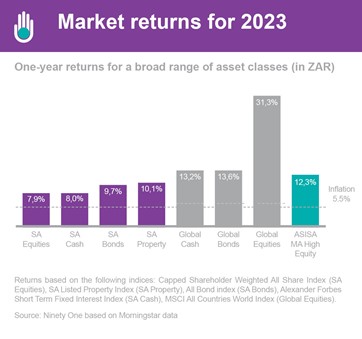

Laura du Preez | 31 January 2024

Laura du Preez has been writing about personal finance topics for more than 20 years, including eight years as personal finance editor for two leading media houses.
2024 will be a noisy election year with many geopolitical risks, but investors in equity and bond markets are most likely to be rewarded with inflation-beating returns, asset managers say.
Last year was a volatile one for investors but it ended with all the asset classes delivering returns above inflation. Global asset classes delivered very high returns, while South African markets were more muted.
 In their outlooks for 2024 managers from Ninety One and AlexForbes say equity and bond markets globally and locally are set to deliver returns better than cash or inflation despite geopolitical, interest rate and election risks. Read more: Why must my investment beat inflation?
In their outlooks for 2024 managers from Ninety One and AlexForbes say equity and bond markets globally and locally are set to deliver returns better than cash or inflation despite geopolitical, interest rate and election risks. Read more: Why must my investment beat inflation?
2024 will be a year of interest rate cuts starting in the US this quarter, then in Europe and lastly late in the year in South Africa, Peter Kent, co-head of emerging market fixed income at Ninety One, says.
Investors who keep their money in cash to avoid choppy short-term market movements will find returns from bank deposits and money markets - especially after tax – will fall as interest rates come down.
In 2023 the MSCI All Countries index – the index for global equity market performance ![]() – returned 31.3% for the year, Clyde Rossouw, head of quality at Ninety One, says.
– returned 31.3% for the year, Clyde Rossouw, head of quality at Ninety One, says.
Much of this return was driven by enthusiasm for artificial intelligence (AI) and the large tech company shares known as the Magnificent Seven – Apple, Microsoft, Alphabet, Amazon, Nvidia, Tesla and Meta.
These shares were responsible for 60% of the return of the S&P500 - a key index for the US equity market that returned 24% in dollars last year.
The depreciation of the rand against the dollar boosted the returns from global asset classes by about 7% last year, Rossouw says.
![]() Fears about loadshedding, grid collapse and possible sanctions against South Africa after the accusations that South Africa was supplying weapons to Russia contributed to the rand’s decline, Kent says.
Fears about loadshedding, grid collapse and possible sanctions against South Africa after the accusations that South Africa was supplying weapons to Russia contributed to the rand’s decline, Kent says.
Many South African investors benefited from the global returns and rand depreciation by being exposed to global markets through rand-denominated multi-asset funds – the unit trust funds used in many retirement funds. Read more: Why are there different kinds of multi-asset funds?
The average return of the multi-asset high equity portfolios last year was 12.3%, Ninety One’s data shows.
![]() High equity multi-asset funds have an average exposure of 35% to global asset classes, Senzo Langa, deputy chief investment officer at AlexForbes, says.
High equity multi-asset funds have an average exposure of 35% to global asset classes, Senzo Langa, deputy chief investment officer at AlexForbes, says.
Langa says some multi-asset funds have allocated close to the maximum limit of 45% of the fund to offshore markets, but others are below 30%. Differences in managers' offshore allocations are the cause of increasing differences in the returns of the top and bottom performing funds in this unit trust sub-category.
Locally the share market struggled last year but managed to return 7.9% for the year – slightly below the 8% return investors earned on ![]() cash investments but still 2.4% above the average inflation rate in South Africa last year.
cash investments but still 2.4% above the average inflation rate in South Africa last year.
Rehana Kahn, deputy of head of equity and multi-asset at Ninety One, says locally listed companies with offshore earnings, like Anheuser-Busch InBev, Aspen and Investec, boosted local market returns last year.
These companies make up 37% of the local listed share market.
Although the remaining shares struggled last year, Ninety One is excited about them potentially delivering good returns in 2024, Kahn says.
South African companies, such as Woolworths, Foschini, the telecommunications and healthcare companies, represent about 39% of the share market. Load shedding, water shortages, problems at Transnet, National Health Insurance and cash-strapped consumers negatively affected these shares, Kahn says.
Coming into 2024, many of these issues have eased. South Africa has created more than 700 000 jobs, the oil price is easing and interest rates are expected to come down in the second half of the year. The consumer wallet is set up for a better year and loadshedding hours are a lot lower, Kahn says.
AlexForbes chief economist Mpho Molopyane says domestic growth prospects look promising. Easing loadshedding, more self-generated electricity coming on line and continued recovery in investment are expected to lift growth from 0.6% last year to 1.2% this year, she says.
Declining inflation and lower interest rates will benefit consumer spending, she says.
Kahn says about 24% of companies listed on the JSE, the likes of Naspers, Richmont, BHP and Anglo American, derive their earnings from China.
![]() Naspers is the largest shareholder in Tencent. The price of Tencent shares prices fell last year due to poor investor sentiment rather than any problems with the company that is set to deliver good earnings this year, Kahn says.
Naspers is the largest shareholder in Tencent. The price of Tencent shares prices fell last year due to poor investor sentiment rather than any problems with the company that is set to deliver good earnings this year, Kahn says.
Other JSE listed companies’ earning revenue from China will also benefit from economic measures and infrastructure spending in that country, Kahn says. Infrastructure spending in China is expected to benefit local commodity producers.
Molopyane says in 2023 investor sentiment oscillated between fears of economic recessions in many important global market countries to expectations of a softer economic outcome.
![]() She says turmoil in the banking sector - the failures of US banks Silicon Valley Bank and Signature Bank and troubles at Credit Suisse – added fuel to fears about a recession and market volatility.
She says turmoil in the banking sector - the failures of US banks Silicon Valley Bank and Signature Bank and troubles at Credit Suisse – added fuel to fears about a recession and market volatility.
The US Federal Reserve’s announcement that it expects to bring inflation in target and to cut interest rates this year makes AlexForbes cautiously optimistic about the year ahead, she says.
Ninety One's managers agree this is good news and will bring relief to consumers and the global economy, but they caution against expecting a repeat of 2023’s high returns.
Iain Cunningham, head of multi-asset growth at Ninety One, says over the past 10 years global equities have delivered more than 9% a year. But valuations are much ![]() higher now and Ninety One therefore expects returns from global equities in the years ahead closer to 5%.
higher now and Ninety One therefore expects returns from global equities in the years ahead closer to 5%.
Rossouw says while some parts of the market are overpriced it is still possible to buy into pockets of market weakness and with robust growth, it will still be possible to earn good returns, he says.
He won’t be chasing any hot AI investment themes and will be watching the risks of geopolitical tensions, deglobalisation, supply chain and the oil price, he says. Read more: How can I invest safely offshore?
Volatility is likely as long as uncertainty remains around the effect of the current high interest rates on the global economy and the multiple elections due to take place in many countries this year. Electioneering and possible election upsets are likely, ![]() AlexForbes’ Molopyane says.
AlexForbes’ Molopyane says.
Ninety One’s Kent says bonds are good to mitigate the many geopolitical risks, as the yield on the South African All Bond Index is 10% which protects you from falling bond prices.
In addition, the rand is undervalued and so has some margin to absorb shocks, he says.
No hard recession and interest rate cuts make a favourable backdrop for both bonds and equities, Molopyane says. But while uncertainty remains a central theme in 2024, a well-diversified portfolio remains essential, she says.
Investing across the asset classes locally and globally should expose you to opportunities and protect you from parts of financial markets that may have risen too high in 2023.
Do unit trusts invest in financial markets outside of South Africa?
Why should interest-bearing investments be part of my investment portfolio?
What is a money market fund?
How do asset classes classify the things in which you can invest?
How can I make money investing in shares?
What is the cash asset class?
What is a bond and how can I invest in bonds?
What is asset allocation?